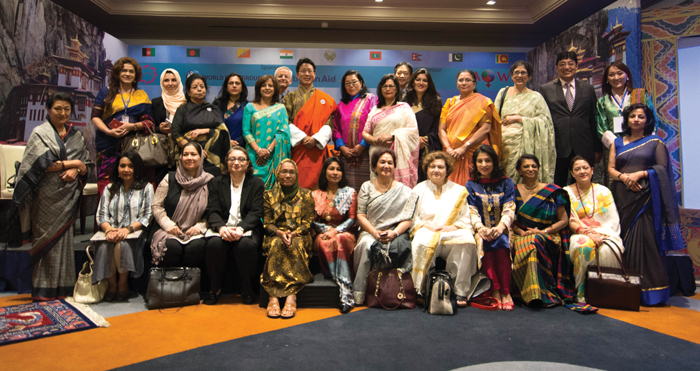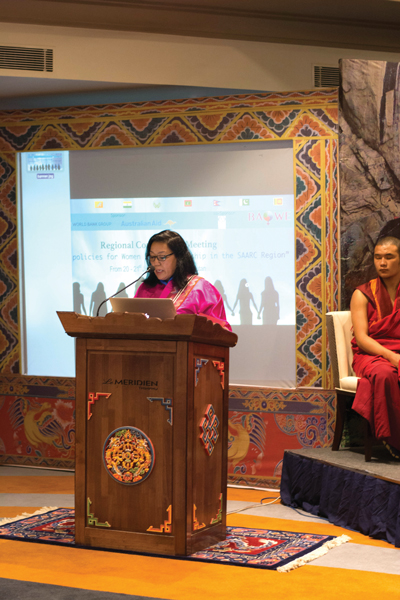
It was a proud moment for Bhutan to finally host the SAARC Regional meet to discuss policies to enhance women in business. But the event unveiled startling revelations; in a mountain of data and evidence presented by all the representatives from the SAARC regions, Bhutan was the only SAARC member country to not have a separate platform for women entrepreneurs, with available data on women entrepreneurs scattered across different agencies, thereby paving the way to discuss why Bhutan needs one for the growing women entrepreneurs.
Women entrepreneurship is a growing phenomenon; with social movements, changing societal values, and a rapidly globalizing world, the number of female-owned businesses is on the rise. The scope of women-owned business ventures is truly staggering, with more than 126 million women entrepreneurs starting or running new businesses in 67 economies in 2012 (Global Report on Women and Entrepreneurship, GEM 2012). In the majority of SAARC’s member countries, however, the gender gap is vast, with women receiving little to no professional opportunity or financial support compared to their male counterparts. In India, women entrepreneurs constitute only 10 percent of the total number of entrepreneurs in the country.
On July 20, Bhutan hosted a seminar on “Effective Policies for Women Entrepreneurship in the SAARC Region”, organized by BAOWE (Bhutan Association of Women Entrepreneurs) and SAWDF(South Asian Women Development Forum). Representatives from member countries of Afghanistan, Bangladesh, India, Pakistan, Nepal, Maldives, Sri Lanka and Bhutan came together to discuss barriers and limitations faced by women entrepreneurs but also discussed possible solutions and opportunities for women venturing into entrepreneurship. The gathering saw inspiring women leaders bringing forth their experiences and ideas about improving conditions for women entrepreneurs. As entrepreneurs and leaders of non-profit organizations convened, numerous points were raised relating to the current state of women in business, and the steps that each country can take to level the playing field and ensure a sense of strength for women. Shanti Chadda, Vice President of SAWDF, Nepal expressed, “The meeting is to bring forward the collective voice of women entrepreneurs from the SAARC region through the networks of experts to the highest level of communities in the SAARC and to identify areas for regional policies for women entrepreneurs.”
But the event unveiled a surprising revelations; in a mountain of data and evidence presented by all the representatives from the SAARC regions, Bhutan was the only SAARC member country to not have a separate platform for women entrepreneurs, with available data on women entrepreneurs scattered across different agencies, thereby paving the way to discuss why Bhutan needs one for the growing women entrepreneur section. “We’ve always been a gender-equal society,” says Damchae Dem, Founder of BAOWE. “Our country’s policies have always catered to all which is why there isn’t specific data on women entrepreneurs. Available information are all scattered across different organizations but now there is a need for one common platform.”
Like an age-old adage, the appeal for a separate platform for women’s issues be it in any field has often been met with scrutiny, so why did the conference highlight so much on the need for a separate chamber of commerce for the women? “Women don’t come forward much in mixed company,” says Damchae Dem. ‘By that I mean, women only feel comfortable to raise issue regarding their business in meetings where there are only women. Women in families have always considered themselves secondary and fail to voice their dreams.” A woman’s domestic responsibilities as a mother, wife and daughter are also reasons why women are at a disadvantage when trying to keep a business afloat. A lack of self-confidence and insecurity in one’s ambition also serves as a severe detriment to the development of women entrepreneurship.
Mariam Khan, a professor and corporate trainer from Pakistan, insists that, “Women should believe in themselves, they are not less than men in any field. Wherever they can put their heart and soul into, they can achieve a lot.” Many agreed that the lack of infrastructure, training and adequate information for women who are interested in running a business can dampen their perception of success. A world wide study conducted by Global Report on Women and Entrepreneurship exposed the fact that women have “lower capabilities” perceptions than men. The extreme setbacks that women entrepreneurs face are further woven into a complex web of rigid stereotypes, societal expectations, personal resolve, lack of resources, and a general deficit of awareness required for this issue.
Bhutan stands as a bit of an odd ball in the midst of its sister nations. Silently acknowledging its slow pace in identifying the issue raised at the conference, the country shed light on the current situation for women in business. “We have been an example of a gender-parity society for a long time and it’s insulting to our neighbours to even compare our plight to the many struggles our sisters in our neighboring countries have experienced. But we do admit that there has been a lack of a formal platform to address the strength and weaknesses of business women. Majority of our unemployed are women, so there is a need for a coordinated, cohesive organization that will allow women to more easily establish a business venture.”
For Bhutan, the dire absence of properly implemented or widespread support for women entrepreneurs is an issue that needs to be addressed in this period of economic growth in the country. Member countries such as Bangladesh have established a Bangladesh Women Chamber of Commerce and Industry with an aim to encourage and strengthen women’s participation in the private sector as entrepreneurs through promoting a women-friendly business environment. In Sri Lanka, a Chamber of Commerce has also been created for women.
“We may not have the data to show like our neighbouring countries, but although the process of change started much later for Bhutan, our country has come so far. Because of the leadership of our Kings, our small country has done so much to help entrepreneurship in general,” remarks Damchae Dem. Other SAARC nations have reliable data about women entrepreneurs and know how to initiate activities to boost women entrepreneurial skills.
When discussing the future of women entrepreneurship, a sense of optimism and unwavering determination permeates the event. Pramila Rijal, President of SAWDF, acknowledges that women entrepreneurship needs to grow at a higher level. “When it comes to business, the challenges are same but there are some gender specific issues which need to be addressed. It’s important that we understand challenges from a women’s perspective.”

The world of business is competitive and demanding and for a woman who has grown up in a society with insufficient infrastructure and support to start a business, the prospects can appear extremely daunting. SAARC reinforces a sense of determination coupled with practical points of advice. Minister of Foreign Affairs, Honourable Lyonpo Damcho Dorji believes that, “Entrepreneurship isn’t for everyone and not everyone is going to be an entrepreneur. But the spirit of the women who are in business, their creativity, resilience embody what’s best for entrepreneurship. “
The future, whether it be for Bhutan or South Asia in its entiretity, holds the potential for women to rise to the forefront of society as leaders of innovation and novelty in their business ventures. The demand for a more cohesive and sufficient infrastructure, and the need for a separate Chamber of Commerce for Women Entrepreneurs in Bhutan will enable more women to participate in business and successfully develop their skills.
“Women are always scared of losing the little things but it’s time that we break out of our comfort zone. We need to be able to be bold, take charge, be brave and look beyond because life is about taking risks – but calculated ones,” concludes Damchae Dem.